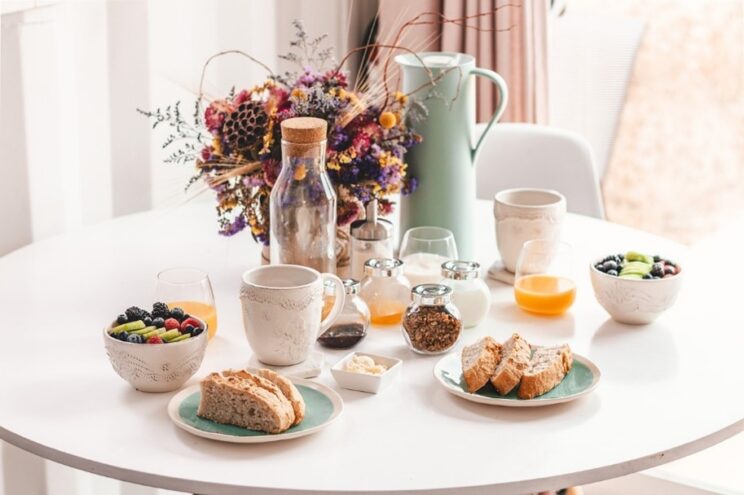
According to nutritionists, breakfast is the most important meal of the day. It provides the body with nutrients to start the new day and helps us to face it with energy and in a better mood. A complete breakfast should include dairy products, carbohydrates in the form of bread or cereals, fruit, and some protein. In addition to this, some kind of stimulant such as coffee or tea can be included to help us wake up and improve our concentration.
However, it is often the meal that we neglect the most since the morning rush does not give us enough time for it. Starting the day with a complete and healthy breakfast is possible, but it requires more time and dedication, from buying the food to actually eating it, including preparation time.
If you are one of those people who neglect breakfast but would like to start adopting habits that are not only healthy, but also sustainable, read on to discover some tips you can use when eating breakfast every day.
Starting with dairy products and a stimulant, you are probably one of those who choose coffee to start the day. If so, the first thing to think about is how to make it. Coffee capsules, one of the most problematic and difficult to manage forms of waste, have been fashionable for some time now. The problem with coffee capsules is that they are not considered packaging, so they cannot be left in the yellow bin and it is very difficult to recycle them. Only a small percentage succeeds, and the rest end up in landfills with the resulting problem of pollution.
Sustainable alternatives can include buying ground coffee or coffee beans, as has traditionally been the case. In the future you can consider buying an energy efficient coffee grinder that does not generate waste when brewing coffee, except for the coffee grounds that should be placed in the brown bin.
Another aspect to take into account, apart from how the coffee is made, is where it originates from. We often don’t know either the place or the process by which the coffee we drink has been grown. If you want to opt for a sustainable breakfast, choose sustainable and fair-trade-promoting coffees.
Fruit for breakfast provides us with vitamins and sugars, which are the main source of energy after several hours of fasting overnight. Our main recommendation when consuming fruit is to choose only those that are in season. They are healthier, taste better, and are at their peak. In addition, this ensures we promote local businesses, as seasonal fruits are generally grown close to the point of sale.
It is also important to remember the importance of buying in bulk. When buying fruit, cereals, bread or biscuits for breakfast, it is common to find products that are overpackaged, sometimes even individually wrapped, which increases the production of plastic waste. Some supermarkets even remove the natural skin of the fruit and surround it with cling film, simply to save the consumer the trouble of peeling it. These plastic containers, although they can be left for recycling in the yellow bin, are dangerous and polluting, since being lightweight they can end up in rivers and seas and adversely affect the environment.
Sustainable alternatives involve choosing products that reduce any unnecessary packaging. You can choose shops that sell products in bulk and take your own reusable containers from home. Regarding bags, you can also bring your own from home, preferably those made of fabric, which are more resistant and durable.
These are just some of the tips and ideas you can think of when preparing your daily breakfast. Stay tuned to our networks, on Instagram @conrde_madrid, and on Twitter @AciertaOrganica, as we continue to post new tips and ideas for healthy habits.
For a healthy and sustainable diet!
